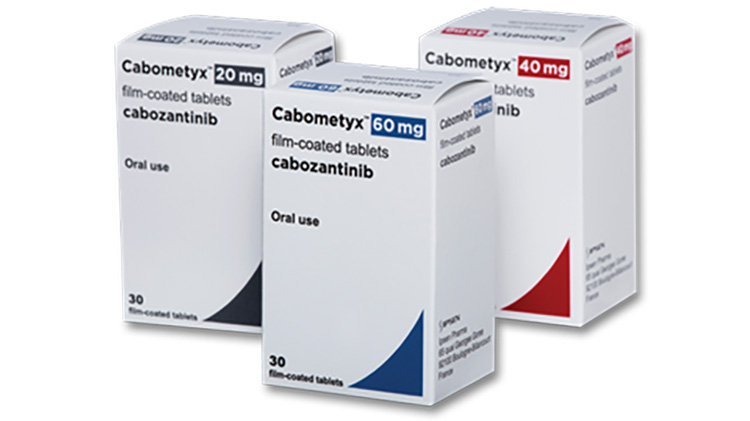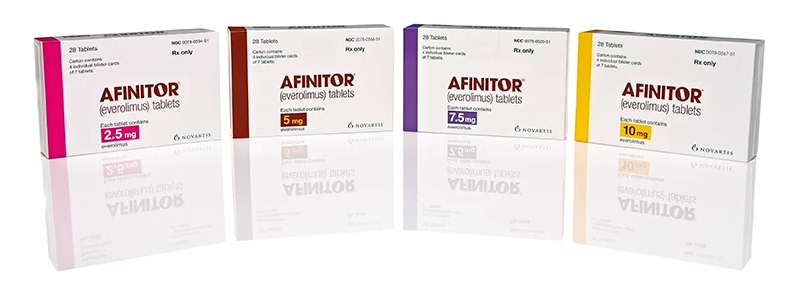Cabometyx (cabozantinib) vs Afinitor (everolimus)
Cabometyx (cabozantinib) vs Afinitor (everolimus)
Cabometyx (cabozantinib) is a tyrosine kinase inhibitor that targets multiple pathways involved in tumor growth and angiogenesis, and is commonly used in the treatment of advanced renal cell carcinoma (RCC) and hepatocellular carcinoma. Afinitor (everolimus), on the other hand, is an mTOR inhibitor that also treats advanced RCC, typically after other treatments have failed, and has applications in various other types of tumors, including breast and pancreatic neuroendocrine tumors. When deciding between Cabometyx and Afinitor, it is important to consider the specific type of cancer, the patient's overall health, previous treatments, potential side effects, and the mechanism of action of each drug, as well as consulting with a healthcare provider for a personalized treatment plan.
Difference between Cabometyx and Afinitor
| Metric | Cabometyx (cabozantinib) | Afinitor (everolimus) |
|---|---|---|
| Generic name | Cabozantinib | Everolimus |
| Indications | Renal cell carcinoma, hepatocellular carcinoma, medullary thyroid cancer | Renal cell carcinoma, subependymal giant cell astrocytoma, renal angiomyolipoma, breast cancer, neuroendocrine tumors, tuberous sclerosis complex |
| Mechanism of action | Tyrosine kinase inhibitor | mTOR inhibitor |
| Brand names | Cabometyx, Cometriq | Afinitor, Zortress |
| Administrative route | Oral | Oral |
| Side effects | Diarrhea, fatigue, nausea, decreased appetite, hypertension, vomiting, weight loss, dysphonia | Stomatitis, infections, rash, fatigue, diarrhea, edema, abdominal pain, nausea, fever, asthenia |
| Contraindications | Hypersensitivity to cabozantinib or any component of the formulation | Hypersensitivity to everolimus or other rapamycin derivatives, or any component of the formulation |
| Drug class | Tyrosine kinase inhibitor | mTOR inhibitor |
| Manufacturer | Exelixis, Inc. | Novartis Pharmaceuticals Corporation |
Efficacy
Cabometyx (Cabozantinib) Efficacy in Kidney Cancer
Cabometyx, with the active ingredient cabozantinib, is a medication that has shown efficacy in the treatment of advanced renal cell carcinoma (RCC), which is the most common type of kidney cancer. Cabozantinib is a tyrosine kinase inhibitor that targets multiple pathways involved in tumor growth and angiogenesis. The efficacy of Cabometyx in kidney cancer was demonstrated in a clinical trial known as METEOR. The trial showed that cabozantinib significantly improved progression-free survival compared to everolimus, a standard treatment at the time. Patients treated with cabozantinib experienced a median progression-free survival of 7.4 months compared to 3.8 months for those on everolimus.
Furthermore, Cabometyx has also been shown to improve overall survival in patients with advanced RCC. In the METEOR trial, the median overall survival was 21.4 months for patients taking cabozantinib, compared to 16.5 months for those taking everolimus. This marked improvement in overall survival highlights the potential of Cabometyx as a significant therapeutic option for patients with this challenging disease.
Afinitor (Everolimus) Efficacy in Kidney Cancer
Afinitor, containing the active substance everolimus, is an mTOR inhibitor used in the treatment of various cancers, including advanced renal cell carcinoma. Everolimus has been shown to be effective in patients with advanced RCC who have failed previous treatment with sunitinib or sorafenib, which are other targeted therapies. In a pivotal study known as RECORD-1, patients treated with Afinitor had a median progression-free survival of 4.9 months, compared to 1.9 months for those given a placebo. This demonstrated that everolimus could delay disease progression in patients with RCC who had progressed on other therapies.
While Afinitor has been a valuable treatment option for kidney cancer, its efficacy must be considered in the context of newer treatments like Cabometyx. As newer agents have become available, the role of everolimus in the treatment landscape of RCC has evolved. It remains an important option, particularly in certain patient populations and in cases where other treatments are not suitable or have been exhausted. However, direct comparisons, such as those from the METEOR trial, have shown that some newer agents may offer more significant benefits in terms of progression-free and overall survival.
Regulatory Agency Approvals
Cabometyx
-
European Medical Agency (EMA), European Union

-
Food and Drug Administration (FDA), USA

-
Health Canada

-
Therapeutic Goods Administration (TGA), Australia

Afinitor
-
European Medical Agency (EMA), European Union

-
Food and Drug Administration (FDA), USA

-
Health Canada

-
Pharmaceuticals and Medical Devices Agency (PMDA), Japan

-
Therapeutic Goods Administration (TGA), Australia

Access Cabometyx or Afinitor today
If Cabometyx or Afinitor are not approved or available in your country (e.g. due to supply issues), you can access them via Everyone.org.
How it works

Make an enquiry
Choose the medicine you want to buy, answer a couple of questions, and upload your prescription to speed things up. We’ll get back to you within 24 hours.


Make an enquiry
Choose the medicine you want to buy, answer a couple of questions, and upload your prescription to speed things up. We’ll get back to you within 24 hours.


Breeze through the paperwork
We'll guide you through the required documents for importing unapproved medicine, ensuring you have all the necessary information.


Get a personalized quote
We’ll prepare a quote for you, including medicine costs and any shipping, administrative, or import fees that may apply.


Receive your medicine
Accept the quote and we’ll handle the rest - sourcing and safely delivering your medicine.

Some text on this page has been automatically generated. Speak to your physician before you start a new treatment or medication.
Let's talk
If you have any questions, call us or send us a message through WhatsApp or email:
Contact us




